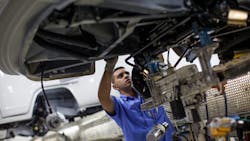Brazilian Autoworkers Fearful of Future Amid Sales Slump
SÃO BERNARDO DO CAMPO, Brazil — Manuel Domingos constantly fears being placed on mandatory leave, like thousands of fellow workers at an auto factory outside São Paulo, proof of the major downturn in Brazil’s once powerful auto industry.
Domingos, a 40-year-old Ford worker, spoke of a “feeling of insecurity” at the São Bernardo do Campo plant in the São Paulo suburbs.
“If we are having to go on holiday, then there’s something not right, either within the company or the economy,” the father of two said. “It’s complicated. We don’t have any choice. These are tough times.”
The automobile industry is mired in a slump in an economy that is in its fifth year of low growth, with the IMF forecasting that GDP will contract by 1.0% in 2015.
Sales nosedived 20% between January and the end of April over the same period last year, according to manufacturers’ association ANFAVEA.
Car dealership association Fenabrave indicated that 250 of Brazil’s 8,000 dealers had closed their doors since the start of the year, with 12,000 jobs lost.
As recently as 2013, the industry had seen record sales of new cars, reaching 10,000 units a day. But the following year saw a steady fall as the government withdrew several tax sweeteners from the sector.
Fear in the air
Confronting the crisis, major automakers such as Ford, General Motors, Mercedes and Volkswagen have placed thousands of employees on mandatory leave as they respond to the falloff in sales.
Based just outside business hub São Paulo, Brazil’s auto industry employs 139,580 people — 9.5% less than just 13 months ago.
Last week, Mercedes Benz announced it was laying off 500 workers and putting 7,000 more on mandatory leave at its plant at São Bernardo do Campo, a city of 800,000 people boasting a long tradition of union membership.
It was also a stronghold of former president Luiz Inácio Lula da Silva, a union leader before the Workers Party he co-founded took power in 2003.
According to media estimates, more than 10,000 auto workers have either been placed on leave or laid off this year across the country, although ANFAVEA has no official figures.
“We are afraid,” said Volkswagen worker Jorge Aparecido Lobo, 48. “Although there is an agreement with the company to maintain jobs, we are concerned to think that if the crisis gets worse, no accord will resist that.”
Brazil is struggling across the board amid rising inflation and interest rates as the limitations of an economic model based on consumption by millions of families emerging from the ranks of the poor become increasingly apparent.
No sign of improvement
“The auto industry depends on three factors: economic growth in general, consumer confidence and access to credit. Right now in Brazil there are difficulties on all three scores,” said Stephen Keese, Latin America expert for Roland Berger consulting.“There is little sign of an improvement in the short term.”
Brazil has in recent months slipped back to being the eighth-largest global auto producer from a previous ranking of fifth. In 2014, the country produced 3.15 million units, 560,000 down on the previous year.
“The problem is installed capacity way above current production. And we are not going to see production volumes above 4 million units in either the short- or medium-term,” Keese said.
Brazilian industry currently has the domestic market in its sights.
Abroad, neighboring Argentina was the prime buyer, but its market is on the slide and ANFAVEA is looking further afield for demand, including to Colombia.
In the meantime, ANFAVEA hopes matters will improve by year’s end.
But Keese warned that Brazil must pursue “a long-term strategy to increase its international presence, as well as greater competitiveness and less bureaucracy,” while paring down logistical and tax costs.
By Natalia Ramos
Copyright Agence France-Presse, 2015
About the Author
Agence France-Presse
Copyright Agence France-Presse, 2002-2025. AFP text, photos, graphics and logos shall not be reproduced, published, broadcast, rewritten for broadcast or publication or redistributed directly or indirectly in any medium. AFP shall not be held liable for any delays, inaccuracies, errors or omissions in any AFP content, or for any actions taken in consequence.
